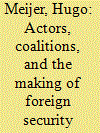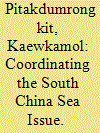| Srl | Item |
| 1 |
ID:
140729


|
|
|
|
|
| Summary/Abstract |
In light of the intertwining logics of military competition and economic interdependence at play in Sino–American relations, this paper examines how the United States has balanced conflicting national security and economic interests in the making of US export control policy on defense-related technology toward China. Relying upon a large body of primary sources (including 170 interviews), it seeks to contribute to the understanding of this strategically sensitive yet neglected area of Sino–American relations. It is shown that, as a consequence of the erosion of the US capacity to control the diffusion of defense-related technology to China in the post-Cold War era, a growing set of actors within the United States has reassessed the security/economic calculus in Washington's relationship with Beijing. Specifically, this coalition advocates the streamlining of export controls to sustain the defense and technological industrial base and thereby maintain American military/technological preeminence vis-à-vis a rising China.
|
|
|
|
|
|
|
|
|
|
|
|
|
|
|
|
| 2 |
ID:
140728


|
|
|
|
|
| Summary/Abstract |
This article studies the roles of Association of Southeast Asian Nations country coordinators in shaping negotiation outcomes, which have been under-examined. A question: ‘What makes an effective coordinator?’ is explored. ‘Effectiveness’ is the ability to shape outcomes in one's direction. This paper argues that a coordinator's effectiveness is rooted in resource management, not resource possession. To be effective, the coordinator must turn the resources at hand into bargaining leverage vis-à-vis the others. To validate the argument, this paper demonstrates how Thailand, taking advantage of its coordinator position, advanced the talks on the Code of Conduct of the South China Sea resulting in the first formal consultation in September 2013.
|
|
|
|
|
|
|
|
|
|
|
|
|
|
|
|
| 3 |
ID:
140731


|
|
|
|
|
| Summary/Abstract |
The paper assesses the role and impact of the middle-power alliance of South Korea–Indonesia–Australia (KIA) in the region. KIA is a middle power and informal grouping. Its three constituents play a key role in the South Korean-based Global Green Growth Institute (GGGI). The paper identifies and discusses how KIA states, within the GGGI, and as a result of their intentions and middle-power strategies, represent a shift away from previous asset or attribute-based middle-power leverage. Instead, a strategic emphasis on issue-specific network positioning is emerging. These strategic and behavioral developments are impacting upon and reflect certain challenges to traditional understandings and expectations of middle-power activity and alliance building in the Asia-Pacific region, and, in the context of their specific responses to climate change impact and governance in the region.
|
|
|
|
|
|
|
|
|
|
|
|
|
|
|
|
| 4 |
ID:
140730


|
|
|
|
|
| Summary/Abstract |
What explains the Japan–South Korea security relationship in the post-Cold War period? This article highlights the impact of the conflict and convergence of identity factors vis-à-vis external factors (such as the North Korean military threat, the regional presence of US forces, and growing Chinese power) to offer a more comprehensive explanation of the ebb and flow of security cooperation between Japan and South Korea. This article argues that in some cases, the identity factors affect security cooperation more than external strategic factors. Based on three in-depth case studies, the article provides an empirical examination of how identity factors have affected the overall pattern of Japan–South Korea security relations since the 1990s. The analysis will have important implications for our understanding of the role of identity factors between Japan and South Korea, as well as envisioning the possibilities of regional security cooperation in the future.
|
|
|
|
|
|
|
|
|
|
|
|
|
|
|
|
| 5 |
ID:
140732


|
|
|
|
|
| Summary/Abstract |
The field of regionalism has been flourishing for some time. Amitav Acharya has been a persistent and powerful voice in the field, and he has contributed to and actively shaped paradigmatic debates within it. His theoretically sophisticated and contextually grounded approach to Southeast Asia's regional order and beyond has inspired countless scholars and better informed generations of students. A group of scholars, therefore, decided to discuss Acharya's contribution to the field of Asian and comparative regionalism more systematically with a view of the balance between disciplinary and area studies, ideas and institutions and non-Western international relations theorizing.
|
|
|
|
|
|
|
|
|
|
|
|
|
|
|
|